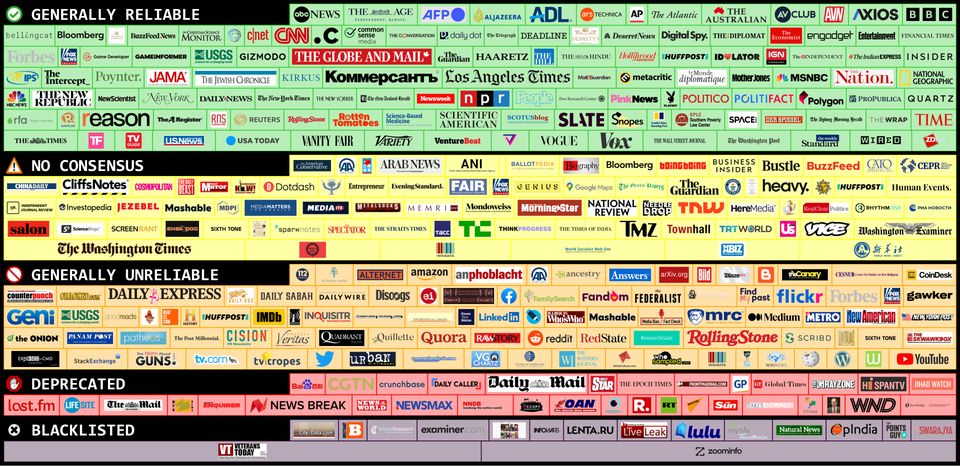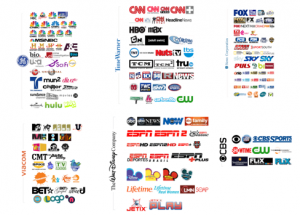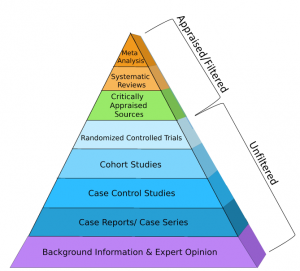Referencing: Difference between revisions
No edit summary |
No edit summary |
||
| Line 1: | Line 1: | ||
''' | '''Our genes and culture has evolved in a world where information used to be scarce and of high authority. The internet changed this, by creating an over abundance of information with questionable authority. There is now too much to read for our information hungry brains yet a lot of it is presented not on the basis of fact but on the basis of getting our attention. Wikipedia has tried to combat this issue by listing which sources are reliable:'''[[File:News hierarchy.jpg|alt=News hierarchy|center|960x960px|News hierarchy]] | ||
[[File:Corporate owners-media.png|alt=Oligo|thumb| | [[File:Corporate owners-media.png|alt=Oligo|thumb|'''Figure 2'''. Oligopolies of meda.]] | ||
[[File:Weighting hierarchy.png|alt=Weighting hierarchy|thumb|Weighting hierarchy]] | [[File:Weighting hierarchy.png|alt=Weighting hierarchy|thumb|Figure 2. Weighting hierarchy]] | ||
However, the word ''reliable'' simply implies they are not making things up, it does not take into account potential [[Cognitive biases|biases]] of each source [[framing]] | However, the word ''reliable'' simply implies they are not making things up, it does not take into account potential [[Cognitive biases|biases]] of each source [[framing]] issues to make it more digestible. | ||
Imagine all the information fictional and non-fictional that could ever be produced was produced and available to anyone via the internet. Every ''fact'' would have an equal amount of arguments for and against it irrelevant of its source. Borges in his book [[wikipedia:The_Library_of_Babel|The Library of Babel]], creates a thought experiment where all possible 410-page books of a certain format and character set are available to anyone. Essentially, within our own confines this represents all knowledge humans '''could''' possibly produce. It would take several life times for one person to read each and every book. Similarly it would take multiple life times to read everything on the internet, understand its source and bias and whittle out the truth. This is especially difficult as our media is being aggregated into oligopolies which often serve a specific agenda (see '''Figure 2'''). | |||
== Critical Appraisal == | |||
Critical appraisal skills should be paramount in the fundamentals of our education. Before we learn anything we need to understand that facts are not binary in nature. | |||
* reduce information overload by eliminating irrelevant or weak studies. | |||
* identify the most relevant papers. | |||
* distinguish evidence from opinion, assumptions, misreporting, and belief. | |||
* assess the validity of the study. | |||
* assess the usefulness and clinical applicability of the study. | |||
Revision as of 00:30, 30 June 2022
Our genes and culture has evolved in a world where information used to be scarce and of high authority. The internet changed this, by creating an over abundance of information with questionable authority. There is now too much to read for our information hungry brains yet a lot of it is presented not on the basis of fact but on the basis of getting our attention. Wikipedia has tried to combat this issue by listing which sources are reliable:
However, the word reliable simply implies they are not making things up, it does not take into account potential biases of each source framing issues to make it more digestible.
Imagine all the information fictional and non-fictional that could ever be produced was produced and available to anyone via the internet. Every fact would have an equal amount of arguments for and against it irrelevant of its source. Borges in his book The Library of Babel, creates a thought experiment where all possible 410-page books of a certain format and character set are available to anyone. Essentially, within our own confines this represents all knowledge humans could possibly produce. It would take several life times for one person to read each and every book. Similarly it would take multiple life times to read everything on the internet, understand its source and bias and whittle out the truth. This is especially difficult as our media is being aggregated into oligopolies which often serve a specific agenda (see Figure 2).
Critical Appraisal
Critical appraisal skills should be paramount in the fundamentals of our education. Before we learn anything we need to understand that facts are not binary in nature.
- reduce information overload by eliminating irrelevant or weak studies.
- identify the most relevant papers.
- distinguish evidence from opinion, assumptions, misreporting, and belief.
- assess the validity of the study.
- assess the usefulness and clinical applicability of the study.


